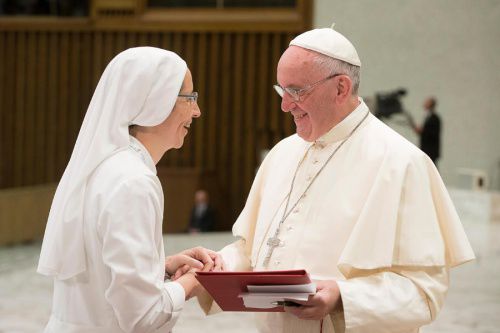Pope Francis exhorted consecrated religious on Thursday to take part in an evangelization which “burns in the heart,” cautioning against gossip and narcissism as prominent dangers of consecrated life. The Pope explained: “to evangelize is not only to convince, it's to give witness that Jesus Christ is alive. And how do I give you this witness? With your flesh, with your life.” While it is good to study and give courses in evangelization, the Pope said, “the ability of warming hearts doesn't come from books, it comes from the heart!” “If your heart is burning from love for Jesus Christ, you are a good evangelizer,” he said. The Pope’s remarks came Sept. 17 in response to questions from consecrated men and women who took part in the World Meeting of Young Consecrated Men and Women. He reflected on the consecrated sister as “the icon of the Mother Church and Mother Mary.” He says she has the “maternity of the Church” and an ability to be close to others. He recounted the story of Korean sisters who ministered at a Buenos Aires hospital without knowing Spanish. They ministered with a caress and a smile. “It was the witness of a heart on fire,” the Pope said. He also warned that consecrated life can be sterile when it is “not quite prophetic” and “not allowed to dream.” Pope Francis acknowledged that consecrated life has moments of instability and temptations, especially the temptation to not forgive. He specifically warned that gossip impedes forgiveness and destroys others’ reputations. “But never, never drop the bomb of gossip. Never, never! It's the plague of community life!” he told his audience. The consecrated religious who gossip “drop a bomb on their community and the community is destroyed.” He said narcissism is one of the worst attitudes of a consecrated religious. “No to narcissism, to looking at oneself. And on the contrary, what strips everything of narcissism, is adoration.” While everyone prays, thanks God, and asks for favors, the Pope asked “do we adore the Lord?” “Do you, religious men and women, have the capacity to adore the Lord?” he asked. “The prayer of silent adoration is the opposite of reflecting oneself in one's own narcissism,” he said, advising the religious to be “men and women of adoration” The Pope also reflected on a special day in his own life: Sept. 21, 1953. “I know that by chance, I entered a Church, I saw a confessional and I left different, I left in a different way. My life changed there. And what fascinated me about Jesus and the Gospel? I don't know.” The Pope said he felt God’s closeness that day. The Lord never left him alone in dark and difficult moments and even in sin. “I also have to say this: we are all sinners,” the Pope added. “And we say it in theory, but not in practice! I remember mine and I'm ashamed. Also in those moments, the Lord has never left me alone. And not just me, everyone. The Lord never leaves anyone.” The Pope also recorded a video message for a meeting of consecrated religious in Hungary, which was shown Sept. 18. “I encourage you to rejoice with those who rejoice and cry with those who cry; to ask God for a heart capable of compassion, to bend down to the wounds of the body and spirit and bring many people the consolation of God,” he told them. Pope Francis praised those who live with the “simplicity of daily life” in the style of the Good Samaritan and lauded those who “draw close to the flesh and tears” of others. “This charity full of mercy - we know it well - comes from the heart of Christ, and is drawn from prayer, especially adoration, and approaching Confession and the Eucharist with faith. Mary our Mother helps us to always be men and women of prayer.” The Church is observing the Year of Consecrated Life, which Pope Francis intended to examine consecrated life as a unique form of Christian discipleship.

